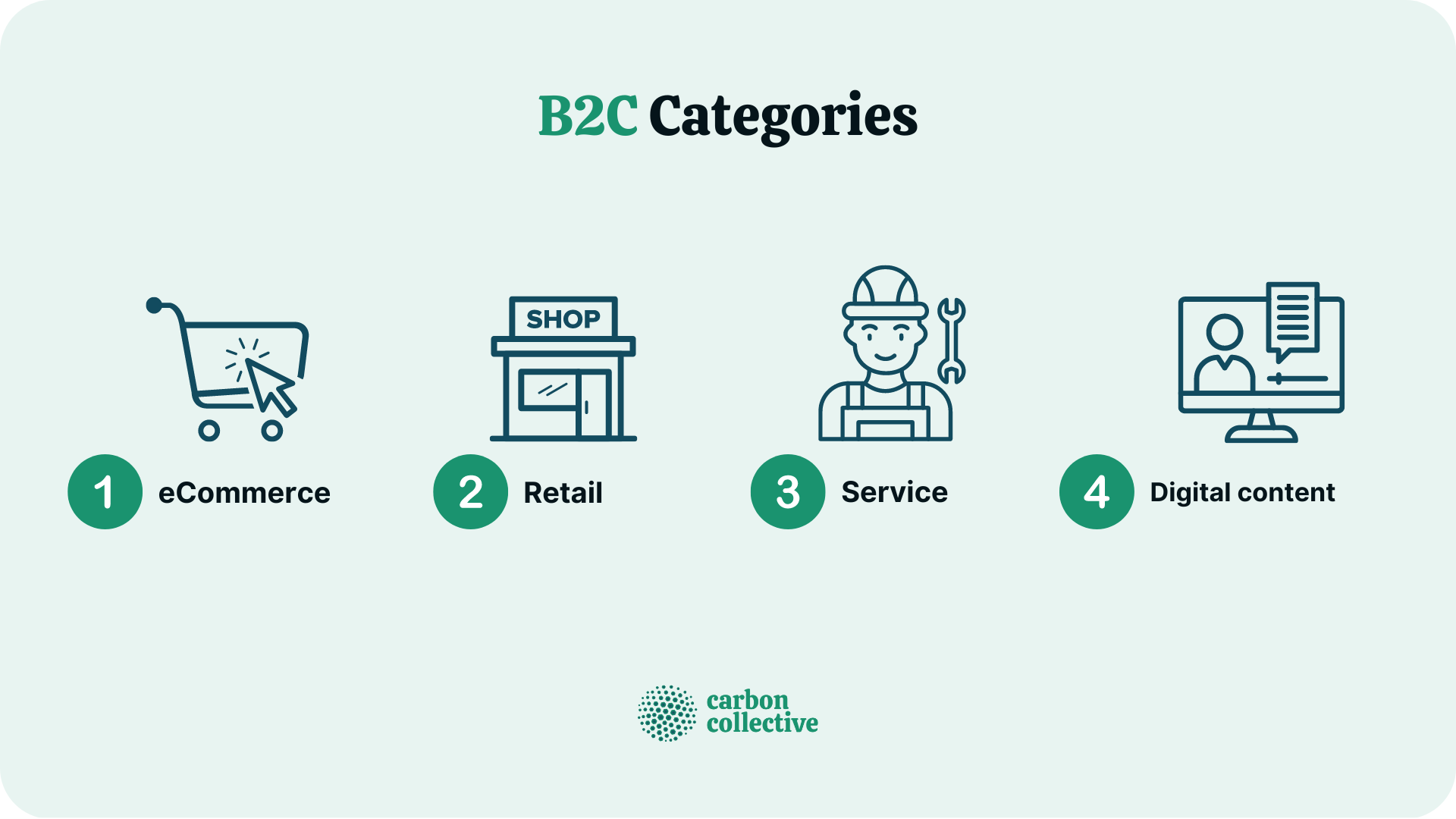Business-To-Consumer (B2C) | Definition, Process, Strategy, & Example
What Is Business-To-Consumer (B2C)?
Business-to-consumer (B2C) is a business model that sells products or services from businesses to consumers.
It is the opposite of business-to-business (B2B), where businesses sell products or services to other businesses. The term “consumer” can refer to individuals or households.
B2C businesses are typically retail businesses, such as e-commerce stores, that sell products or services directly to consumers.
Who Is Involved in a B2C Transaction?
In a B2C transaction, there are two parties involved:
-
The business:
This is the company that produces and sells the product or service.
-
The consumer:
The individual or household purchases the product or service from the business.
How Does the B2C Process Work?
The B2C process is the series of steps a business takes to sell its products or services to consumers.
The steps in the B2C process include the following:
1. Marketing: The business creates awareness for its product or service through marketing activities, such as advertising, public relations, and social media.
2. Sales: The business sells its product or service to consumers. This can be done through online channels, such as an e-commerce store, or offline channels, such as a brick-and-mortar retail store.
3. Delivery: The business delivers the product or service to the consumer. This can be done electronically, through email or download, or physically through shipping.
4. Customer service: The business provides customer service to the consumer. This can include answering questions, resolving issues, and providing refunds or returns.

B2C Marketing Strategies
Businesses use various marketing strategies to reach consumers and promote their products or services.
Some common B2C marketing strategies include:
1. Advertising: This is a paid form of marketing where businesses create ads to promote their products or services. Advertising can be done through traditional channels, such as television, radio, and print, or online channels, such as social media and search engines.
2. Public relations: This form of marketing where businesses try to generate positive publicity for their products or services. This can be done through press releases, media relations, and events.
3. Social media: This is a form of marketing where businesses use social media platforms, such as Facebook, Twitter, and Instagram, to connect with consumers and promote their products or services.
4. Direct marketing: This is a form of marketing where businesses reach out to consumers directly to promote their products or services. This can be done through direct mail, telemarketing, and email marketing.
5. Content marketing: This is a form of marketing where businesses create and share content, such as blog posts, infographics, and videos, to promote their products or services.

B2C Categories
There are three main categories of business-to-consumer businesses:
1. eCommerce: This is a type of B2C business that sells products or services online through an e-commerce store.
2. Retail: This is a type of B2C business that sells products or services offline through a brick-and-mortar store.
3. Service: This is a type of B2C business that provides services, such as haircuts, car repairs, and legal advice, to consumers.
4. Digital content: This is a type of B2C business that sells digital content, such as eBooks, online courses, and software products, to consumers.

Examples of B2C Businesses
Some examples of business-to-consumer businesses include:
1. Amazon:
This is an eCommerce B2C business that sells various products, such as books, electronics, and clothes, to consumers online.
2. Walmart:
This is a retail B2C business that sells various products, such as food, furniture, and toys, to consumers offline.
3. Starbucks:
This is a service B2C business that provides coffee and other drinks to consumers.
4. iTunes:
This digital content B2C business sells music, movies, and TV shows to consumers.
5. GEICO:
This is an insurance B2C business that sells car insurance to consumers.
B2C vs B2B
Business-to-consumer (B2C) businesses are different from business-to-business (B2B) businesses in a few key ways:
1. B2C businesses sell to individual consumers, while B2B businesses sell to other businesses.
2. B2C businesses typically have shorter sales cycles than B2B businesses.
3. B2C businesses typically sell lower-priced products or services than B2B businesses.
4. B2C businesses typically have more customers than B2B businesses.
5. B2C businesses typically use different marketing strategies than B2B businesses.

The Bottom Line
Business-to-consumer (B2C) businesses sell products or services to individual consumers.
There are three main types of B2C businesses: e-commerce, retail, and service. Some examples of B2C businesses include Amazon, Walmart, Starbucks, and iTunes.
B2C businesses differ from business-to-business (B2B) businesses in a few key ways, such as the type of customer they sell to and their marketing strategies.
FAQs
1. What is a business-to-consumer (B2C) business?
A business-to-consumer (B2C) business is a type of business that sells products or services to individual consumers.
2. What are the different types of B2C businesses?
There are three main types of B2C businesses: e-commerce, retail, and service.
3. What are some examples of B2C businesses?
Some examples of B2C businesses include Amazon, Walmart, Starbucks, and iTunes.
4. What is the difference between a B2C and a B2B business?
The main difference between a B2C business and a B2B business is the type of customer they sell to. B2C businesses sell to individual consumers, while B2B businesses sell to other businesses.
5. What are some common marketing strategies used by B2C businesses?
Some common marketing strategies used by B2C businesses include content marketing, social media marketing, and email marketing.















![Toni Kroos là ai? [ sự thật về tiểu sử đầy đủ Toni Kroos ]](https://evbn.org/wp-content/uploads/New-Project-6635-1671934592.jpg)


